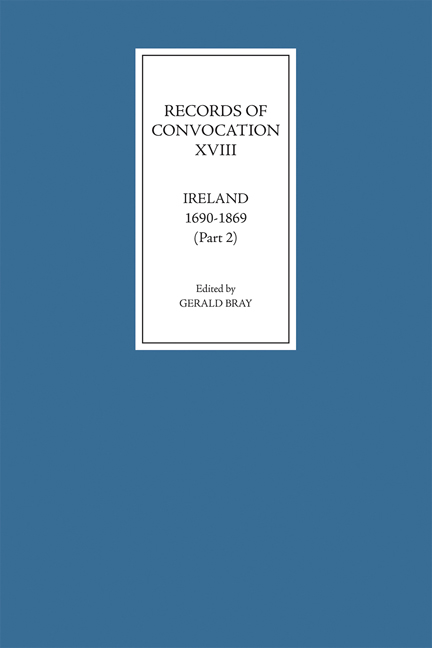Book contents
- Frontmatter
- Content
- Abbreviations
- Anne (1702-14)
- George I (1714-27)
- George II (1727-60)
- George III (1760-1820)
- George IV (1820-30)
- William IV (1830-7)
- Victoria (1837-1901)
- A table of proportions to be paid by the archbishops and bishops
- Prolocutors of the Irish national convocation, 1615-1869
- Membership of the convocation of the Church of Ireland
- Irish bishops in the house of lords, 1801-70
- The Nova Taxatio of Pope Nicholas IV in Ireland
- The Province of Armagh
- The Province of Cashel
- The Province of Dublin
- The Province of Tuam
- The Valor in Hibernia
- Irish clerical taxation
- Guide to source material
- The Irish convocation controversy, 1708-11
- Index of sources
- Index of references
- Index of names and places
- Index of subjects
- Bibliography
The Irish convocation controversy, 1708-11
Published online by Cambridge University Press: 11 January 2024
- Frontmatter
- Content
- Abbreviations
- Anne (1702-14)
- George I (1714-27)
- George II (1727-60)
- George III (1760-1820)
- George IV (1820-30)
- William IV (1830-7)
- Victoria (1837-1901)
- A table of proportions to be paid by the archbishops and bishops
- Prolocutors of the Irish national convocation, 1615-1869
- Membership of the convocation of the Church of Ireland
- Irish bishops in the house of lords, 1801-70
- The Nova Taxatio of Pope Nicholas IV in Ireland
- The Province of Armagh
- The Province of Cashel
- The Province of Dublin
- The Province of Tuam
- The Valor in Hibernia
- Irish clerical taxation
- Guide to source material
- The Irish convocation controversy, 1708-11
- Index of sources
- Index of references
- Index of names and places
- Index of subjects
- Bibliography
Summary
Following the development of the convocation controversy in England, attempts were made by the high church party there to appeal to the example of the Irish convocation in support of their claims for the autonomy of the lower house. This in tun sparked off a debate in Ireland,, in the course of which the following tracts were published.
1. [Francis Atterbury], Some proceedings of the convocation A. D. 1705. Faithfully represented. To which is prefixed an account of the several ineffectual attempts at divers times made by the lower clergy, towards quieting all disputes, and proceeding upon synodical business. London, 1708.
This work was the immediate cause of the Irish controversy because it contained the speech made by William Perceval and Francis Higgins to the lower house of the Canterbury convocation on 4 February 1706 (pp. 26-9). In a note before the preface, the (anonymous) author writes:
To the most reverent, right reverend and reverend, the members of the convocation of Ireland. The following papers do, among other things, contain several matters of fact which relate to the present synodical constitutions of your church. The publisher of them thinks he can take no better way to satisfy his readers of the truth and justness of those representations, that by appealing to the testimony of your venerable body.
He, moreover, apprehends that the consequences of that dispute, to which they refer, may, in the event, affect the Church of Ireland no less than that of England. As the restoration of your legal synods (sitting equal[ly] by the parliamentary and provincial writs) soon followed the revival of ours, so may it justly e presumed that the fate of these several assemblies will hereafter be the same; and that their authority, reputation and privileges, declining in the one, will, in due time, proportionately sink also in the other kingdom. He therefore equally prays for the prosperity of both these assemblies, and after doing what in him lies to promote it, cheerfully leaves the issue of the cause to divine providence.
- Type
- Chapter
- Information
- Records of Convocation , pp. 451 - 454Publisher: Boydell & BrewerFirst published in: 2024

